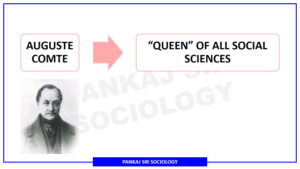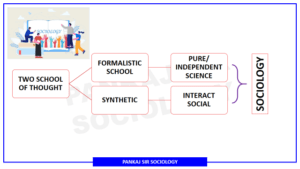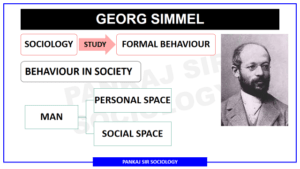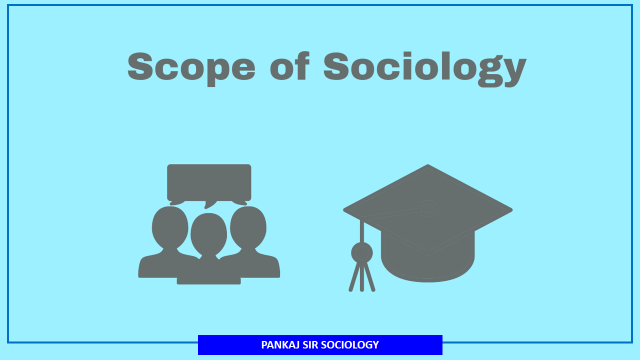INTRODUCTION

- The term “Sociology” is derived from the Latin word ‘societies’ meaning ‘society’ and the Greek word ‘logos’ meaning ‘study or science’.
- Sociology, a discipline coined by French philosopher Auguste Comte in 1839, began to be taught separately in various countries at different times: 1876 in the United States, 1889 in France, 1907 in Great Britain, after World War I in Poland and India, 1925 in Egypt and Mexico, and 1947 in Sweden.
- Sociology is the youngest of all the Social Sciences.
- Essentially, Sociology is the study of human behavior in groups, the interaction among human beings, social relationships, and the processes by which human group activity takes place.
DEFINITION OF SOCIOLOGY
- Sociology is defined differently by various sociologists, each with their own perspective on the nature and scope of the subject.
- According to Ward, it is the “science of society”, while George Simmel sees it as the study of human inter-relationships.
- Giddens considers sociology to be the “scientific study of society”, and Max Weber views it as the “science that seeks to understand social actions”.
- Ogburn’s perspective is that “sociology is concerned with studying social life and its connections to culture, the natural environment, heredity, and group dynamics”.
SCOPE OF SOCIOLOGY
Sociologist and others differ what should be the scope of sociology. August Comte makes us believe that sociology should try to study social phenomena on scientific lines. He has thus laid stress on scientific approach. Emile Durkheim has tried to separate sociology from other social science subjects and also tried to give an independent status to this subject. In his own way Pareto has tried to give it scientific orientation. According to him in sociology there should be no place for inferences. He is sure that there is basic unity among various social phenomena. He is of the view that sociology is much of science and social problems should and can be scientifically studied. Max Weber has however said that sociology should merely be interpretative understanding of social actions and nothing beyond that.
- Sociologists and other scholars have differing opinions on the scope of sociology.
- August Comte believed that sociology should study social phenomena using a scientific approach.
- Emile Durkheim sought to separate sociology from other social science subjects and give it independent status.
- Pareto emphasized the scientific orientation of sociology and rejected the use of inferences.
- He believed in the basic unity among social phenomena and the scientific study of social problems.
- Max Weber, on the other hand, argued that sociology should focus solely on interpretative understanding of social actions.

There are two primary perspectives on the scope of sociology.
Formalistic School
- The formal school of thought argues that sociology should not be broad and instead focus on specific aspects of society. Proponents of this view advocate for keeping the subject pure and independent, emphasizing its study of social relationships, activities, and processes of socialization.
- Simmel’s perspective is that sociology differs from other specialized sciences in that it addresses the same subjects but from a unique perspective, specifically focusing on various modes of social relationships.

- Max Weber also defines a specific domain for Sociology. In his view, the purpose of Sociology is to interpret and comprehend social behavior. However, social behavior does not encompass all human relationships, as not all human interactions are considered social.
- Another advocate of this perspective, Vier Kandt, believes that sociology should limit its focus to the examination of the formal rather than the actual behavior of people in society.
Synthetic school
- This perspective argues that sociology should examine society in its entirety and not limit itself to the study of specific social issues.
- Auguste Comte advocates for an expanded scope of sociology, stating that focusing on one aspect of society can lead to inaccurate conclusions, as all aspects of society are interconnected, similar to the interconnected parts of the human body.
- Hobb-House and Sorokin also support this viewpoint, emphasizing the importance of sociology studying society as a whole.
- Durkheim’s perspective is that “sociology is the study of collective representations within society”. He emphasizes the significance of the collective presence of people in society, suggesting that a broader scope for collective representation arises from the majority of people being present. This leads to the emergence of social facts, which play a crucial role in guiding and regulating societal behavior.
- Sorokin’s perspective is that “sociology is a science of generalization”. He is known for establishing systematic study in the field. In his work “Contemporary Sociology,” he notes that sociology is a general science, focusing on the overall traits of society and the connections between social and non-social phenomena.
- Hobhouse’s perspective is that “sociology is a synthesis of various social sciences”. He suggests that sociology is a comprehensive study that examines society as a whole, encompassing all aspects. He emphasizes that sociologists should focus on specific parts of society in their studies, and then integrate their findings with those of other social sciences to interpret society holistically.
Task question – How has globalization impacted the scope of sociology in India? Discuss.
Answer writing pattern–
Introduction:
The Scope of Sociology and its Evolution:
Discussing the Changing Scope of Sociology in the Context of Globalization, Supported by Thinkers’ Perspectives:
Conclusion:


